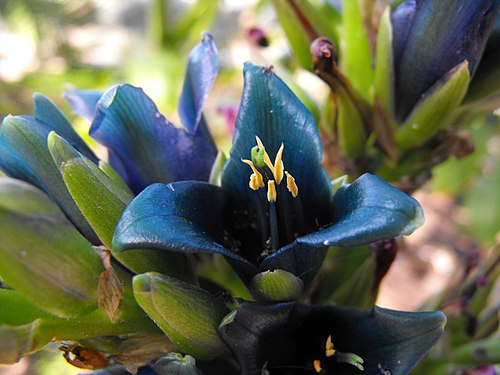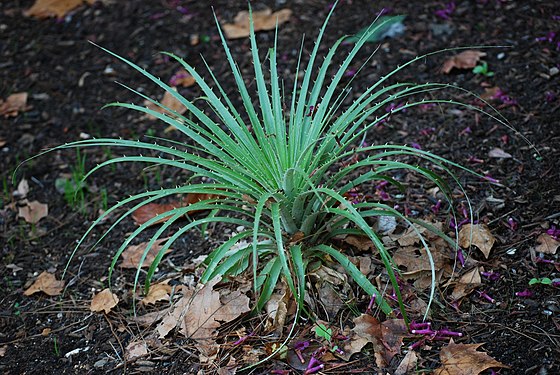Difference between revisions of "Puya alpestris"
(Created page with '{{SPlantbox |Min ht metric=cm |Temp Metric=°F |image=Upload.png |image_width=240 }} {{Inc| Puya alpestris, Poepp. (Pitcairnia caerudea, Baker. Puya Whytei, Hook. f. Pitcairnia a…') |
|||
| (3 intermediate revisions by the same user not shown) | |||
| Line 1: | Line 1: | ||
{{SPlantbox | {{SPlantbox | ||
| + | |familia=Bromeliaceae | ||
| + | |genus=Puya | ||
| + | |species=alpestris | ||
| + | |common_name=Sapphire Tower | ||
| + | |name_ref=http://www.californiagardens.com/plant_pages/puya_alpestris.htm | ||
| + | |habit=bromeliad | ||
|Min ht metric=cm | |Min ht metric=cm | ||
| + | |origin=Chilean Andes | ||
| + | |lifespan=perennial | ||
| + | |exposure=sun | ||
| + | |water=moderate, dry | ||
| + | |features=evergreen, flowers | ||
| + | |flower_season=early spring, late winter | ||
| + | |flowers=green, blue, single | ||
|Temp Metric=°F | |Temp Metric=°F | ||
| − | |image= | + | |min_zone=9.5 |
| + | |max_zone=12 | ||
| + | |image=Puyaalpestris2.JPG | ||
|image_width=240 | |image_width=240 | ||
}} | }} | ||
| + | '''''Puya alpestris''''' is a species of [[Bromeliaceae|bromeliad]] native to [[Chile]]an [[Andes]] and grown as an [[ornamental plant]]. It produces a clump of gray-green, spike-edged leaves and bolts a tall [[inflorescence]] containing many flowers. The flower is an unusual [[Teal (color)|teal]] color with bright light orange pollen. | ||
| + | |||
{{Inc| | {{Inc| | ||
| − | Puya alpestris, Poepp. (Pitcairnia caerudea, Baker. Puya Whytei, Hook. f. Pitcairnia alpestris, Bailey). Fl.-cluster much branched or panicled, with bracts more serrate than in P. caerulea: fls. very large and showy, with a flaring mouth, dull metallic blue. Chile | + | Puya alpestris, Poepp. (Pitcairnia caerudea, Baker. Puya Whytei, Hook. f. Pitcairnia alpestris, Bailey). Fl.-cluster much branched or panicled, with bracts more serrate than in P. caerulea: fls. very large and showy, with a flaring mouth, dull metallic blue. Chile.—A plant in bloom has the habit of a yucca. |
}} | }} | ||
| Line 27: | Line 44: | ||
<gallery> | <gallery> | ||
| − | + | File:Puyaalpestris1.JPG | |
| − | + | File:Puyaalpestris3.JPG | |
| − | + | File:Puya alpestris 3.jpg | |
| + | File:Puya alpestris 2a.JPG | ||
| + | File:Puya alpestris 2.jpg | ||
| + | File:Puya alpestris 1.jpg | ||
</gallery> | </gallery> | ||
==References== | ==References== | ||
| + | *Steens, A. & Y. Cave. (2003) ''Bromeliads for the Contemporary Garden''. Portland: Timber Press, page 132. | ||
*[[Standard Cyclopedia of Horticulture]], by L. H. Bailey, MacMillan Co., 1963 | *[[Standard Cyclopedia of Horticulture]], by L. H. Bailey, MacMillan Co., 1963 | ||
<!--- xxxxx *Flora: The Gardener's Bible, by Sean Hogan. Global Book Publishing, 2003. ISBN 0881925381 --> | <!--- xxxxx *Flora: The Gardener's Bible, by Sean Hogan. Global Book Publishing, 2003. ISBN 0881925381 --> | ||
Latest revision as of 18:27, 8 August 2010
| Habit | bromeliad
| |
|---|---|---|
| Lifespan: | ⌛ | perennial |
| Origin: | ✈ | Chilean Andes |
| Bloom: | ❀ | early spring, late winter |
| Exposure: | ☼ | sun |
|---|---|---|
| Water: | ◍ | moderate, dry |
| Features: | ✓ | evergreen, flowers |
| USDA Zones: | 9.5 to 12 | |
| Flower features: | ❀ | green, blue, single |
|
Puya > |
Puya alpestris is a species of bromeliad native to Chilean Andes and grown as an ornamental plant. It produces a clump of gray-green, spike-edged leaves and bolts a tall inflorescence containing many flowers. The flower is an unusual teal color with bright light orange pollen.
Read about Puya alpestris in the Standard Cyclopedia of Horticulture
|
|---|
|
Puya alpestris, Poepp. (Pitcairnia caerudea, Baker. Puya Whytei, Hook. f. Pitcairnia alpestris, Bailey). Fl.-cluster much branched or panicled, with bracts more serrate than in P. caerulea: fls. very large and showy, with a flaring mouth, dull metallic blue. Chile.—A plant in bloom has the habit of a yucca.
|
Describe the plant here...
Cultivation
Propagation
Pests and diseases
Species
Gallery
If you have a photo of this plant, please upload it! Plus, there may be other photos available for you to add.
References
- Steens, A. & Y. Cave. (2003) Bromeliads for the Contemporary Garden. Portland: Timber Press, page 132.
- Standard Cyclopedia of Horticulture, by L. H. Bailey, MacMillan Co., 1963
External links
- w:Puya alpestris. Some of the material on this page may be from Wikipedia, under the Creative Commons license.
- Puya alpestris QR Code (Size 50, 100, 200, 500)






